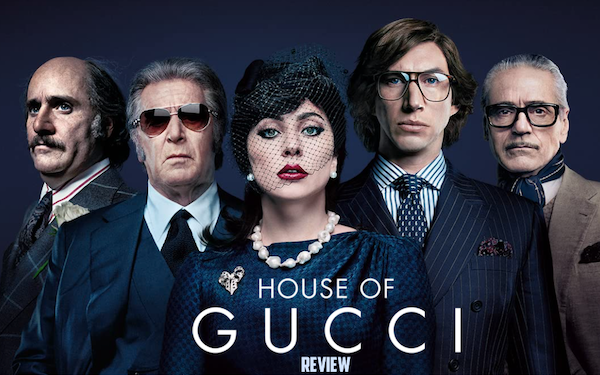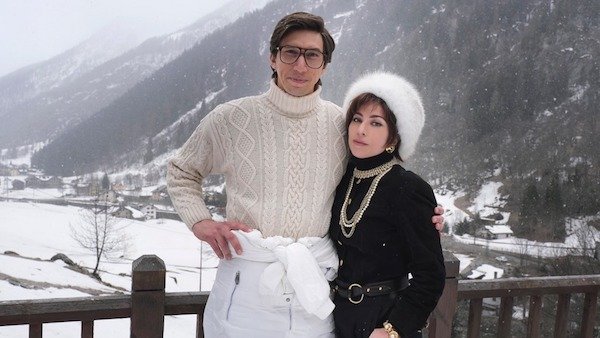House Of Gucci: An Elegantly Conventional Biopic Filled With Vibrant Performances
Ridley Scott drops his second film of 2021 with House Of Gucci. Inspired by the shocking true story of the family behind the Italian fashion empire, this elegantly conventional biopic is filled to the brim with vibrant performances and depicts one of fashion’s biggest murders.
When Patrizia Reggiani, an outsider from humble beginnings, marries into the Gucci family, her unbridled ambition begins to unravel their legacy and triggers a reckless spiral of betrayal, decadence, revenge, and ultimately...murder.
Spanning from 1978 to 1995, House Of Gucci chronicles the romance between Patrizia Reggiani (Lady Gaga) and Maurizio Gucci (Adam Driver), which spirals into a vicious power struggle over the Gucci brand that eventually culminates in assassination. It teases the murder in the opening scene, as we see Maurizio go about his day leading up to his death, before quickly pedaling back to the beginning, to Milan, where Patrizia and Maurizio first cross paths at a party. The pair are polar opposites; Gaga’s Patrizia is devilishly wild and outspoken, and Driver’s Maurizio is shy and innocent. Although Patrizia comes from a blue-collar background, where she worked for her father in his ground transportation business, she has a clear go-getter attitude, and once she lays eyes on Maurizio, it’s clear that she’ll go the necessary lengths to get tangled up in his affluent life.
And she does indeed. Despite the threat of being cut from Maurizio’s father, Rodolfo’s, will, the two get married in a very lopsided ceremony (in terms of familial attendance). Their union is the first of many Gucci family rifts depicted in the film, and the fact that Maurizio is willing to leave his father’s money to work for Patrizia’s father really shows the love and sacrifice he made for her — which simultaneously heightens the fact that she ultimately took everything from him. The film is largely about greed, power, and what they drive an individual to do, but it also suggests that Patrizia wasn’t always in it for the money and status, that there was love there before things turned gruesome and violent.
The film is elegantly conventional in both approach and trajectory, and it hits all its story beats neatly and on cue. The scope and operatic nature of its blood feud give it a Godfather vibe, with the assassination angle giving it a shade of I, Tonya (although it is not as playful in its form or quite as much fun). The sets, costumes, performances, and overall traditional approach evokes the feel of Soderbergh’s Behind The Candelabra. The writing and tone, which are a bit wobbly from time to time, are likely to be the major pain points for many; however, many of the film’s shortcomings are assuaged by the performances, the cinematography, and way in which Scott builds out his scenes.
The performances here are varied but uniformly excellent. Lady Gaga proves she’s the real deal; whereas, Driver, Pacino, Irons, and, yes, even Jared Leto, who is so buried in prosthetics he’s almost unrecognizable, prove that they've still got it. Gaga really steals the show though, and she’ll likely get a nomination come Oscar time. Unlike A Star Is Born, which found her playing a version of herself, she plays someone wildly different from her actual self. She really comes into her own and exhibits quite a bit of versatility and range; she’s venomous, charming, scheming, seductive, and scary. Sometimes, like in a scene where she aggressively humps Adam Driver, she’s several of these at once. She’s very animated and bordering on caricature, but she never really crossed that line (for us). Leto, on the other hand, keeps his toes on the line at all times. He’s the most caricaturish and campy out of the cast, and despite our personal feelings about him, we admit that him playing a buffoonish hack is quite satisfying.
The cinematography is very atmospheric, and it’s almost constantly shrouded in fog, dust, and smoke. There’s even a vaporous haze that spills out of a a refrigerator on a hot Italian day. The interiors are also shrouded in a pervasive layer of cigarette smoke. This perpetual haze, which is just as prevalent in New York City, where the cigarette smoke is equally plentiful, gives House Of Gucci a glamorous, dreamlike allure. The cinematography also plays with warm and cold, light and dark, undulating between vibrant exteriors and dimly lit interiors for heightened contrast.
The most interesting aspect, however, is the way Scott constructs his scenes, which utilize backgrounds and sound design to add layers and create a more tactile feel. In one scene, a dog nonchalantly drinks from a fountain in the background (which seems to relate to Patrizia’s character). In another, pigeons are used to give some shading to Leto’s Paolo (who is the veritable pigeon of the Gucci family). In another, cats can be heard fighting in the background of a scene that directly follows Maurizio dumping Patrizia. It’s not exclusive to animals either; there’s also the white and red ski outfits (which highlight the angel/devil relationship between Maurizio and Patrizia), or the use of the Simon game (which underscores the power dynamic at play), or windshield wipers that are left running on a car’s windshield in the background of an argument between Driver and Gaga. Hell, there’s even a scene where fencing appears in the background (visually and aurally), which also reinforces the familial dueling that’s taking place. All of these instances help to make the film more lush and engaging.
Overall, House Of Gucci is about greed and how business sometimes leads to bloodshed. It’s a fairly traditional biopic that delivers the performances and the craftsmanship you’d expect out of a Ridley Scott film. There are some strange stylistic choices, like a sudden (and brief) shift from color to black and white, but they weren’t enough to impede on the film’s enjoyment. Despite its flaws, it manages to be a pretty good time at the movies.
Recommendation: If you’re interested in the real-life story or just want to see loads of quality performances (which are likely to receive buzz come Oscar time), give House Of Gucci a whirl.
Rating: 3.5 espressos outta 5.
What do you think? We want to know. Share your thoughts and feelings in the comments section below, and as always, remember to viddy well!



